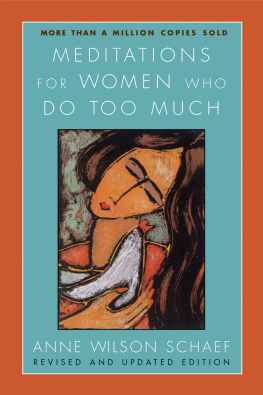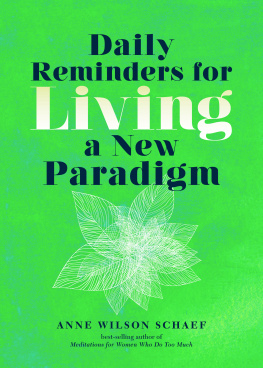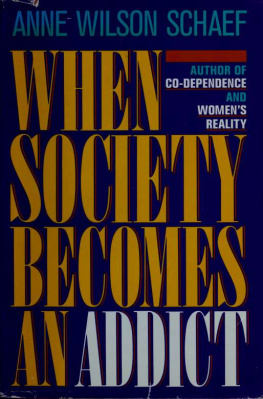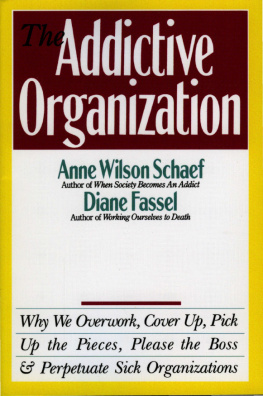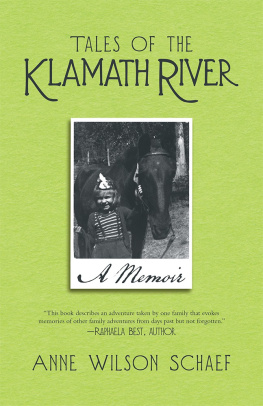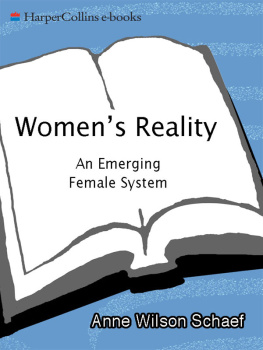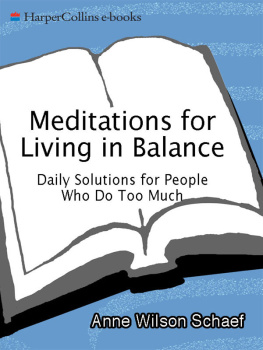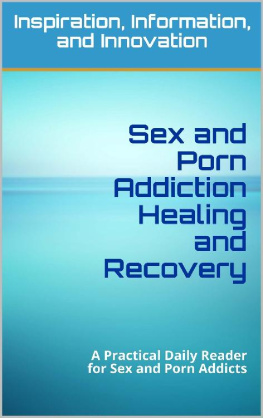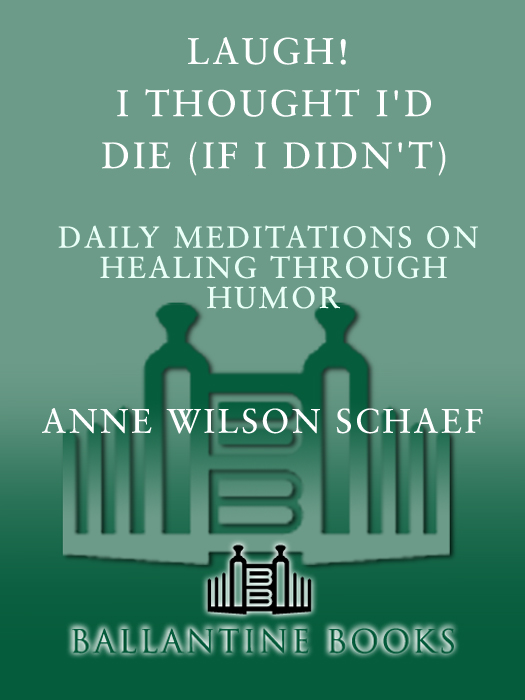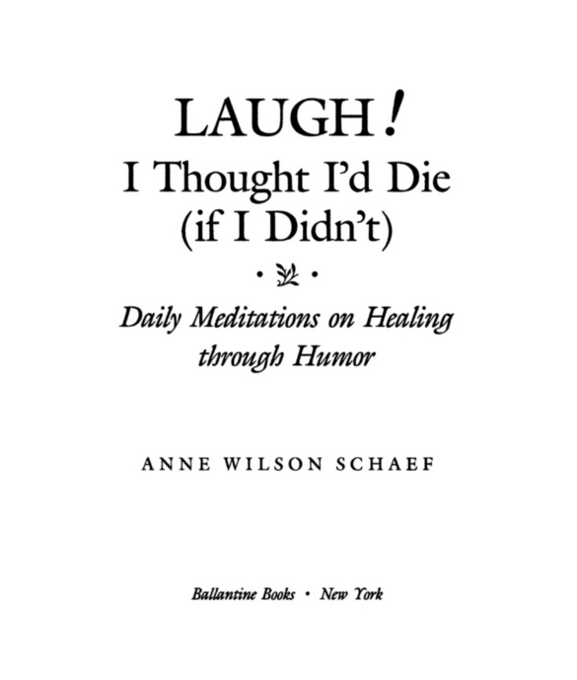Copyright 1990 by Anne Wilson Schaef
All rights reserved under International and Pan-American
Copyright Conventions. Published in the United States by Ballantine Books, a division of Random House, Inc., New York, and simultaneously in Canada by Random House of Canada Limited, Toronto.
Library of Congress Catalog Card Number: 89-90929
eISBN: 978-0-8041-5113-9
v3.1
Contents
Introduction
I come from a family where the quip, the tease, and the practical joke are all part of the daily fare. We spent a lot of time laughing and playing as I was growing up. The humor in our family was always done lovingly with a lot of tenderness that could be easily felt. We never knew when a practical joke was going to be played upon us and there was never an edge of hostility or anger which I have since learned is present in so many families. We were a simple family that didnt have much money but we sure had a lot of fun.
There was an earthy hillbilly flavor in our family and our humor. This sense of humor has carried through my life and is, I believe, one of the greatest gifts I have had from my parents. One of the greatest encouragements for growth in our family was being lovingly teased into a new awareness. Hence, I grew up learning to laugh at myself first and then to laugh with others at our human foibles without any judgment being attached.
In my family, we took life seriously and we also played with it. Often what could have been turned into a tragedy or holocaust was turned into a giggle or a guffaw. A flat tire that became a picnic; my mothers single-handed dismantling and packing of our campground because she thought she heard a mountain lion in the bushes; the time we were stuck in the sand up to our axle; or the time my mother, father, boyfriend, and I took a jeep trail in Oregon in our sedan too early in the season and my dad got out to see why we were stuck (it was dark!) and stepped into an icy puddle up to his crotch and uttered the first and last swearword I have ever heard from himDamn! We had to spend the night in the car, but not until we faced the suppressed giggles that kept the car shaking and had a good laugh about my fathers one foray into swearing. All of these incidents became family lore, told over and over (often embellished over the years) as we laughed at ourselves and each other.
Consequently my work is laced with a lot of laughter. I think that somewhere down deep I intuitively believe that humorless people are really dangerous and, at best, I just dont comprehend them. So, at my speeches, in the intensives, at the trainings, and in my life there is much humor, much laughter, much cutting up, and great one-liners.
Hence, you can imagine my delighted relief when I discovered that people in recovery were funny. They laughed at themselves, they laughed at the disease, they laughed at their disease, and they shared jokes that only recovering folks could understand. At first, I thought that some of the humor I heard in recovering circles was a little tough or hard. After a while I realized that it was tough and hard because it was true. Good humor is usually profound. And profundities are often best accepted when they are uttered humorously!
I saw how healing the recovering humor was. For example, Sam Meier (Serenity Sam), a well-known speaker and humorist in recovery circles, tells the story of an amazing Alcoholics Anonymous group he experienced early in recovery. That was an amazing group, he states. We had one guy in the group who had a kid who was sniffing gasoline. He would come home and find him passed out on the lawn and he would say, That damned kid, I dont know whether hes dead or vapor-locked! Gallows humor? One had to be there to get the full impact. Humor is really only possible if we personally know that place. Or Sam talks about a time when he had been in recovery for several years, was attending meetings and working the Twelve-Step program of Alcoholics Anonymous, and in spite of that (can you imagine?!) was slipping into a suicidal depression. One night after a meeting he decided to go home and kill himself (usually not a topic for humor!). He drove the car into the garage, left the motor running, and went into the house to write three (count them) suicide notes. He shares that they became a little more extensive than he had expected (surprise!), and then he did the dishes, as he didnt want to leave a mess. He then went out to the car and lay down in the backseatbut he realized he had to go to the bathroom and he didnt want anyone to find him with wet pants (no control issues here!), so he went in to go to the bathroom. When inside, the phone started ringing and he couldnt resist picking it up. It was a newcomer to Alcoholics Anonymous in a depression. Well, he could not resist telling him about the joys of sobriety and now he tells the story.
Rather strange fare for humor, one might think butnot if youve been there. As the humorist and essayist C. W. Metcalf says, Humor is about perspectivea willingness to access joy even in adversity. These are my kind of folks! I felt at home and loved the laughter. Sue Tysoe Myers says in the Journal of Journeys, Acknowledging our experience of knowing our perfection is a giggle. The giggle is beyond the realm of the physical, mental and spirit, its the pure joy of being.
As I experienced the fun in my work and the hilarity (sometimes!) of recovery, I thought we needed some daily meditations that were funny, captured the humor and joy of recovery, and made recovering humor available to all of us.
I like many of the meditation books that are out, and they are so serious. This book is not meant to replace them, it is intended to complement them. As C. W. Metcalf says, You need to take yourself lightly and your problem seriously. You are not your problem.
So I thought I would try my hand at some daily meditations that were laser-light (and, perhaps, laserlike). At first I wanted to call the book Each Day a New Giggle or One Guffaw at a Time, but my agent and publisher thought I might get into trouble (what a new experience!) for being irreverent (hardly seems likely). So this book, Laugh! I Thought Id Die (if I Didnt), came into being.
There is a meditation for each day and the meditations also are coded according to topic-whichever meets your needs or (if you dont have a need, where did you come from?) whatever meets your fancy.
There are several sources for these pages. I have picked up comments at meetings or at the intensives I do Sometimes they are credited as anonymous or with a first name or first name and initial. I have gleaned some jokes, stories, and comments from old-timers at meetings, on tapes, and at conventions. Credit is given where possible. I have also taken the wit of some well-known folks and focused it upon recovery, and I have used quips that have come to me over the years and as I was writing this book. Special mention needs to be made here of Mark Twain, Will Rogers, and Bob Burns, who came from the part of the country where my roots are. I grew up with their humor, and they were mentors for me. When I started to work on this book, I uttered a little prayerId like a little help, pleaseand the jokes started coming so fast that I was giggling until 4:00 a.m. that night until I begged for some rest. I have had many companions on this journey, both seen and unseen.


